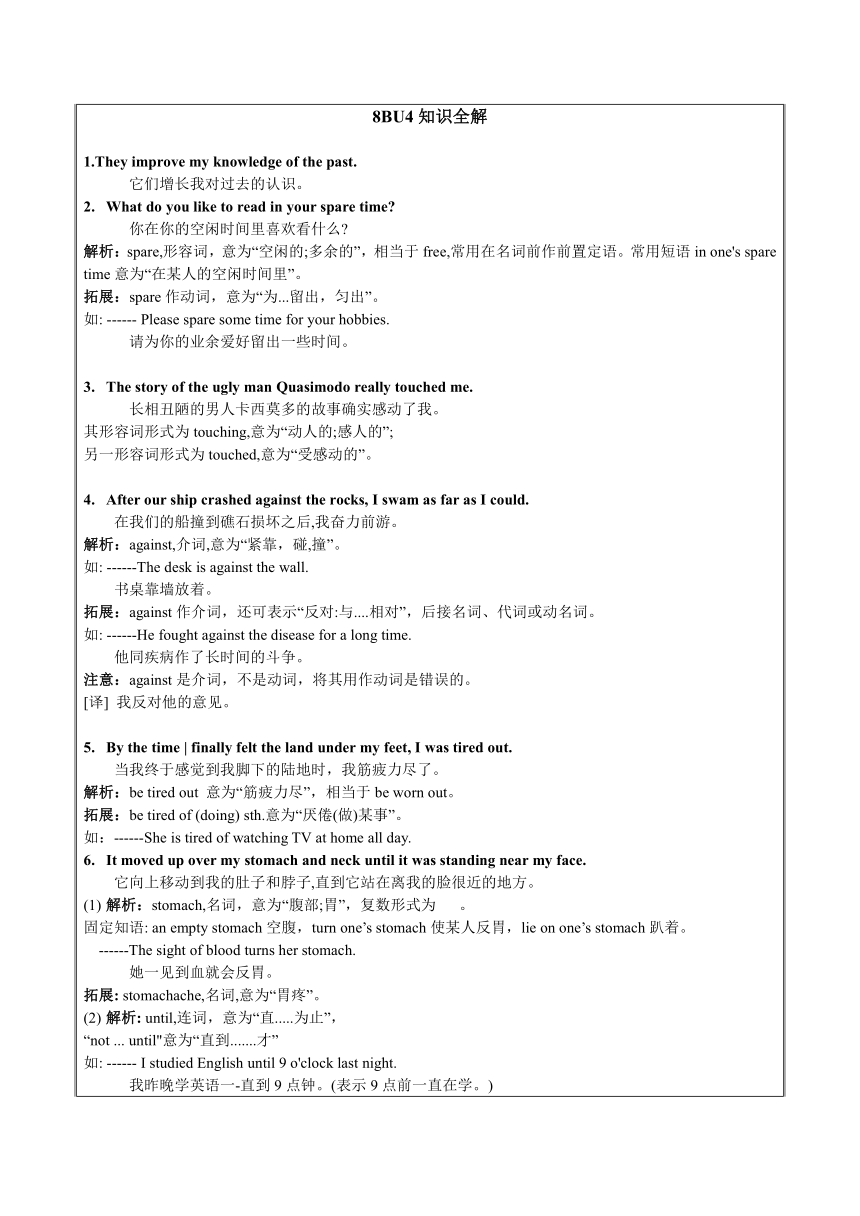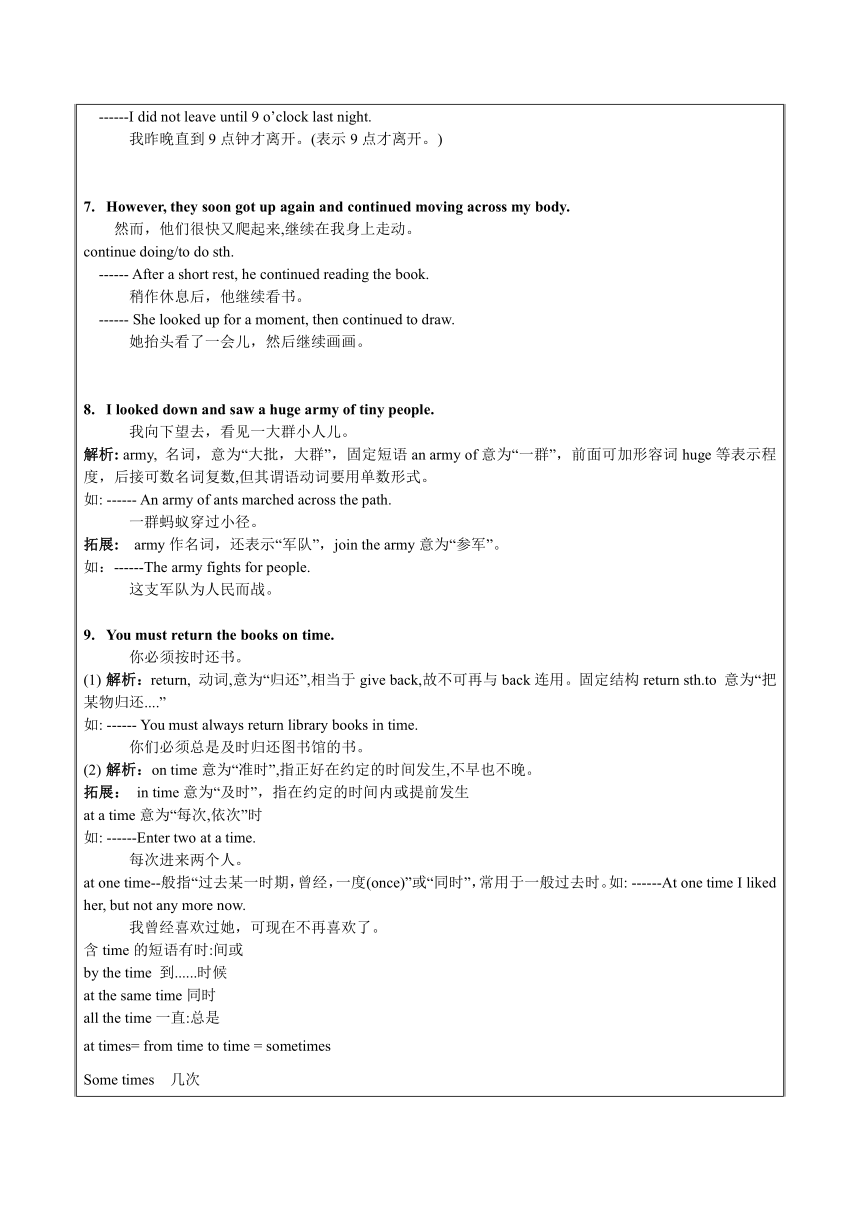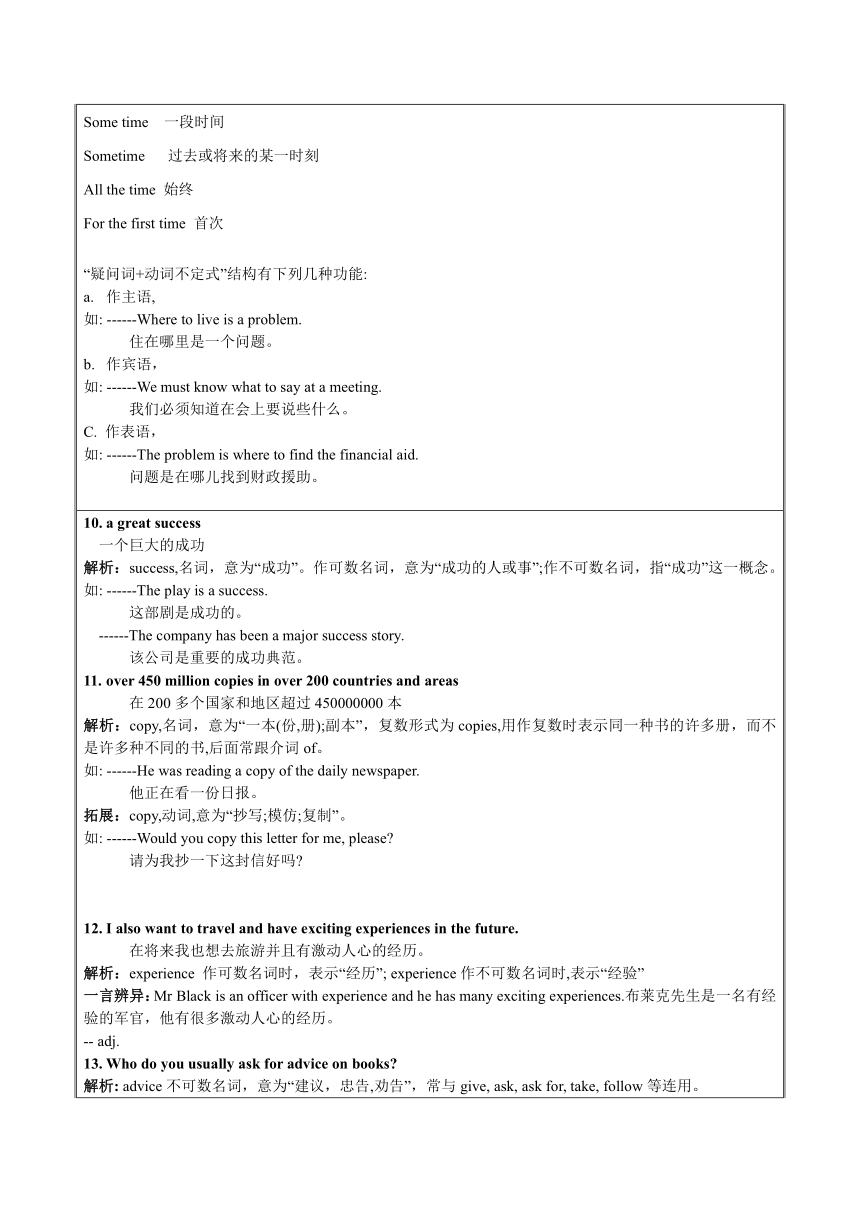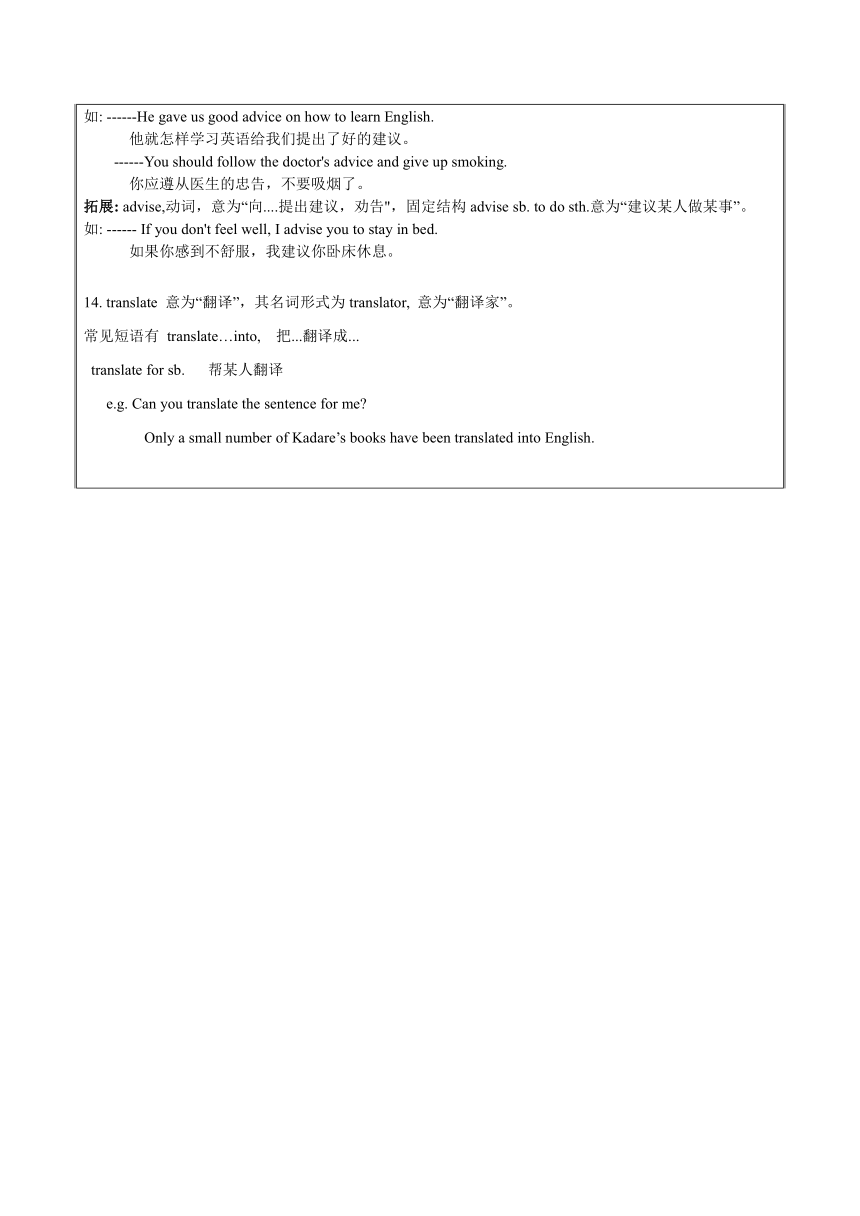牛津译林版英语八年级下册Unit 4 A good read 知识全解讲义+练习(无答案)
文档属性
| 名称 | 牛津译林版英语八年级下册Unit 4 A good read 知识全解讲义+练习(无答案) |  | |
| 格式 | zip | ||
| 文件大小 | 27.0KB | ||
| 资源类型 | 教案 | ||
| 版本资源 | 牛津译林版 | ||
| 科目 | 英语 | ||
| 更新时间 | 2022-03-14 20:15:57 | ||
图片预览




文档简介
8BU4知识全解 1.They improve my knowledge of the past. 它们增长我对过去的认识。 What do you like to read in your spare time 你在你的空闲时间里喜欢看什么 解析:spare,形容词,意为“空闲的;多余的”,相当于free,常用在名词前作前置定语。常用短语in one's spare time意为“在某人的空闲时间里”。 拓展:spare作动词,意为“为...留出,匀出”。 如: ------ Please spare some time for your hobbies. 请为你的业余爱好留出一些时间。 The story of the ugly man Quasimodo really touched me. 长相丑陋的男人卡西莫多的故事确实感动了我。 其形容词形式为touching,意为“动人的;感人的”; 另一形容词形式为touched,意为“受感动的”。 After our ship crashed against the rocks, I swam as far as I could. 在我们的船撞到礁石损坏之后,我奋力前游。 解析:against,介词,意为“紧靠,碰,撞”。 如: ------The desk is against the wall. 书桌靠墙放着。 拓展:against作介词,还可表示“反对:与....相对”,后接名词、代词或动名词。 如: ------He fought against the disease for a long time. 他同疾病作了长时间的斗争。 注意:against是介词,不是动词,将其用作动词是错误的。 [译] 我反对他的意见。 By the time | finally felt the land under my feet, I was tired out. 当我终于感觉到我脚下的陆地时,我筋疲力尽了。 解析:be tired out 意为“筋疲力尽”,相当于be worn out。 拓展:be tired of (doing) sth.意为“厌倦(做)某事”。 如:------She is tired of watching TV at home all day. It moved up over my stomach and neck until it was standing near my face. 它向上移动到我的肚子和脖子,直到它站在离我的脸很近的地方。 解析:stomach,名词,意为“腹部;胃”,复数形式为 。 固定知语: an empty stomach空腹,turn one’s stomach使某人反胃,lie on one’s stomach趴着。 ------The sight of blood turns her stomach. 她一见到血就会反胃。 拓展: stomachache,名词,意为“胃疼”。 解析: until,连词,意为“直.....为止”, “not ... until"意为“直到.......才” 如: ------ I studied English until 9 o'clock last night. 我昨晚学英语一-直到9点钟。(表示9点前一直在学。) ------I did not leave until 9 o’clock last night. 我昨晚直到9点钟才离开。(表示9点才离开。) However, they soon got up again and continued moving across my body. 然而,他们很快又爬起来,继续在我身上走动。 continue doing/to do sth. ------ After a short rest, he continued reading the book. 稍作休息后,他继续看书。 ------ She looked up for a moment, then continued to draw. 她抬头看了一会儿,然后继续画画。 I looked down and saw a huge army of tiny people. 我向下望去,看见一大群小人儿。 解析: army, 名词,意为“大批,大群”,固定短语an army of意为“一群”,前面可加形容词huge等表示程度,后接可数名词复数,但其谓语动词要用单数形式。 如: ------ An army of ants marched across the path. 一群蚂蚁穿过小径。 拓展: army作名词,还表示“军队”,join the army意为“参军”。 如:------The army fights for people. 这支军队为人民而战。 You must return the books on time. 你必须按时还书。 解析:return, 动词,意为“归还”,相当于give back,故不可再与back连用。固定结构return sth.to 意为“把某物归还....” 如: ------ You must always return library books in time. 你们必须总是及时归还图书馆的书。 解析:on time意为“准时”,指正好在约定的时间发生,不早也不晚。 拓展: in time意为“及时”,指在约定的时间内或提前发生 at a time意为“每次,依次”时 如: ------Enter two at a time. 每次进来两个人。 at one time--般指“过去某一时期,曾经,一度(once)”或“同时”,常用于一般过去时。如: ------At one time I liked her, but not any more now. 我曾经喜欢过她,可现在不再喜欢了。 含time的短语有时:间或 by the time 到......时候 at the same time同时 all the time一直:总是 at times= from time to time = sometimes Some times 几次 Some time 一段时间 Sometime 过去或将来的某一时刻 All the time 始终 For the first time 首次 “疑问词+动词不定式”结构有下列几种功能: 作主语, 如: ------Where to live is a problem. 住在哪里是一个问题。 作宾语, 如: ------We must know what to say at a meeting. 我们必须知道在会上要说些什么。 作表语, 如: ------The problem is where to find the financial aid. 问题是在哪儿找到财政援助。
a great success 一个巨大的成功 解析:success,名词,意为“成功”。作可数名词,意为“成功的人或事”;作不可数名词,指“成功”这一概念。 如: ------The play is a success. 这部剧是成功的。 ------The company has been a major success story. 该公司是重要的成功典范。 over 450 million copies in over 200 countries and areas 在200多个国家和地区超过450000000本 解析:copy,名词,意为“一本(份,册);副本”,复数形式为copies,用作复数时表示同一种书的许多册,而不是许多种不同的书,后面常跟介词of。 如: ------He was reading a copy of the daily newspaper. 他正在看一份日报。 拓展:copy,动词,意为“抄写;模仿;复制”。 如: ------Would you copy this letter for me, please 请为我抄一下这封信好吗 I also want to travel and have exciting experiences in the future. 在将来我也想去旅游并且有激动人心的经历。 解析:experience 作可数名词时,表示“经历”; experience作不可数名词时,表示“经验” 一言辨异:Mr Black is an officer with experience and he has many exciting experiences.布莱克先生是一名有经验的军官,他有很多激动人心的经历。 -- adj. Who do you usually ask for advice on books 解析: advice不可数名词,意为“建议,忠告,劝告”,常与give, ask, ask for, take, follow等连用。 如: ------He gave us good advice on how to learn English. 他就怎样学习英语给我们提出了好的建议。 ------You should follow the doctor's advice and give up smoking. 你应遵从医生的忠告,不要吸烟了。 拓展: advise,动词,意为“向....提出建议,劝告",固定结构advise sb. to do sth.意为“建议某人做某事”。 如: ------ If you don't feel well, I advise you to stay in bed. 如果你感到不舒服,我建议你卧床休息。 14. translate 意为“翻译”,其名词形式为translator, 意为“翻译家”。 常见短语有 translate…into, 把...翻译成... translate for sb. 帮某人翻译 e.g. Can you translate the sentence for me Only a small number of Kadare’s books have been translated into English.
一、单项填空
They _______ the train until it disappeared (消失) in the distance (在远处).
A. saw B. watched C. noticed D. realized
He will use what he has _______ her a new dress. Her birthday is coming.
A. bought B. to buy C. buying D. been bought
The old lady didn’t know _______ when the house caught fire.
A. how to do with it B. how to do C. what to do D. what to do it
He _______ until it began to rain.
A. didn’t stop working B. didn’t stop to work
C. stopped to work D. stopped working
—_______ they _______ the book _______ to the library yet
—Yes, they have.
A. Have; returned; / B. Have; returned; back C. Did; return; / D. Did; return; back
Don’t try to do everything at once. Take it a bit _______.
A. at times B. at that time C. at all times D. at a time
—Be careful! A car may hit you.
—Thank you! I _______ I _______ so close to the road.
A. didn’t know; am standing B. don’t know; am standing
C. didn’t know; was standing D. didn’t know; would stand
—You’d better ask Mr Wang for help when _______ problems.
—I see, but I’m not sure when _______ time.
A. you have; having B. having; he has C. to have; he has D. to have; having
—_______ I wash the clothes now
—No, you _______. You _______ clean the room first.
A. Must; don’t have to; may B. Must; needn’t to; must
C. Must; mustn’t; can D. Shall; may; may
( ) 10. Mary didn’t know who _______ the problem she met with at that time.
A. to talk about B. to talk to about C. will take to about D. will to talk
Everyone had an application form in his hand, but no one knew which office room _______.
A. to send it to B. to send it C. it to send D. it send to
The _______ woman _______ Shanghai since her husband died in 1990.
A. lonely; has gone to B. alone; has left C. lonely; has been in D. alone; has been to
—Is Mrs Liu a teacher with a lot of teaching _______
—Yes, she is. But she had some bad _______ at the beginning.
A. experiences; experience B. experience; experiences
C. experience; experience D. experiences; experiences
Before _______ the medicine (药), _______ should study the instructions or follow the doctor’s _______ .
A. you take; you; advise B. you take; one; advice C. taking; one; advice D. taking; you; advise
—Bob called to say welcome back.
—Really _______.
A. It’s OK B. You’re welcome C. Thanks for telling me D. It doesn’t matter
二.单词拼写
We can learn a lot of ________________ (知识) in class if we listen carefully.
_______________ (管理) a company is much harder than you think.
What he did really ________________ (感动) us a lot.
Don’t give up. I’m sure your hard work will lead to _______________ (成功).
Amy doesn’t like wearing the blue sweater. Annie doesn’t like it, _______________ (也).
The English book was so popular that 20,000 _______________ (册) were sold out in a week.
It’s the _______________ (丑陋的) city I have ever seen in this beautiful country.
The old man put a bag of rice on his right _______________ (肩膀) and left the shop.
Nobody could understand why he _______________ (拒绝) to accept the invitation (邀请).
The driver drove _______________ (碰,撞) the wall carelessly and broke his new car.
三、 用所给词的适当形式填空
I ______________ (interview) more than ten businessmen so far.
Many businessmen _______________ (donate) money to help the people in Japan rebuild their homes after the earthquake the year before last.
What great fun it is _______________ (see) so many beautiful butterflies!
You _______________ (drive). Don’t talk on the mobile phone.
Li Ping is asking his uncle, an English teacher, __________ (help) him think of a foreign name.
—Look! Someone _______________ (clean) the sofa.
—Well, it wasn’t me. I didn’t do it.
Everyone should know how _______________ (save) themselves when a fire breaks out.
_______________ you _______________ (hear) from your parents recently I miss them very much as well.
Please keep warm. The temperature ________________ (drop) a little tomorrow morning.
The old man had to continue ________________ (work) to support his family after he retired (退休).
11.Why not learn _______________ (cook) with me at my uncle’s restaurant
12. At the end of the story, the professor came back from some _______________ (hide) hole.
13. I am going to stay with a _______________ (France) family during my study in Paris.
14. Mo Yan is one of the most famous _______________ (write) in China.
15. When he woke up, he found himself tied to a tree, _______________ (able) to move.
四.完成句子
1. 你清楚你的写作该向谁寻求帮助吗?
Are you clear ___________________________________________________ your writing
2. 关于如何提高我的英语,你能给我一些意见吗?
Can you give me ________________________________________________________
3. 她够聪明,知道该如何处理不同的问题。
She is ______________________________________________________ different problems.
4. 到目前为止,这本书已被翻译成了20种语言。
So far, the book _______________________________________________________.
5. 直到昨天早上他才上交他的那篇评论。
He _________________________________________ yesterday morning.
五.任务型阅读
A long story about people is usually called a novel. It can be about any kind of man, woman, or child. It can be about kings, or Chicago newsboys, or housewives. The French writer, Victor Hugo, wrote his novel Les Miserables about a poor man who stole (偷) a loaf of bread. The American writer, Ernest Hemingway, wrote A Farewell to Arms about a young American with the Italian Army in World War One.
A novel can tell the story of any kind of action, over any period of time. The modern Irish writer, James, Joyce, covers less than twenty-four hours in Ulysses. Yet, Joyce takes a thousand pages to tell all that happens from the time one man gets up in the morning until he goes to bed early the next morning. A German writer, Herman Hesse, uses only one hundred and fifty pages in his novel Demian to cover a boy’s life from the age of ten until he becomes a young man.
A novel does not just tell the things that people do. It also tells why they do them. The Badge of Courage, by the American novelist, Stephen Crane, tells about a young soldier who runs away the first time he is in the war. The book shows why he acted as he did. It describes his mental suffering (精神折磨) until he overcomes his fears.
People buy novels because they enjoy reading about other people. The novel meets the human desire (欲望) to know and understand other people.
Definition (定义) It is a long story about people.
Character (1) of any kind Les Miserables is about a man who stole bread.
A Farewell to Arms is about a young American with the Indian Army.
(2) Cover any period of time Ulysses covers less than 24 hours.
Demian to cover a boy’s life from the age of ten (3) he becomes a young man.
Plot (情节) Things and (4) for doing them. The Badge of Courage describes a young soldier’s mental suffering.
Purpose Meet the human desire to know (5) .
a great success 一个巨大的成功 解析:success,名词,意为“成功”。作可数名词,意为“成功的人或事”;作不可数名词,指“成功”这一概念。 如: ------The play is a success. 这部剧是成功的。 ------The company has been a major success story. 该公司是重要的成功典范。 over 450 million copies in over 200 countries and areas 在200多个国家和地区超过450000000本 解析:copy,名词,意为“一本(份,册);副本”,复数形式为copies,用作复数时表示同一种书的许多册,而不是许多种不同的书,后面常跟介词of。 如: ------He was reading a copy of the daily newspaper. 他正在看一份日报。 拓展:copy,动词,意为“抄写;模仿;复制”。 如: ------Would you copy this letter for me, please 请为我抄一下这封信好吗 I also want to travel and have exciting experiences in the future. 在将来我也想去旅游并且有激动人心的经历。 解析:experience 作可数名词时,表示“经历”; experience作不可数名词时,表示“经验” 一言辨异:Mr Black is an officer with experience and he has many exciting experiences.布莱克先生是一名有经验的军官,他有很多激动人心的经历。 -- adj. Who do you usually ask for advice on books 解析: advice不可数名词,意为“建议,忠告,劝告”,常与give, ask, ask for, take, follow等连用。 如: ------He gave us good advice on how to learn English. 他就怎样学习英语给我们提出了好的建议。 ------You should follow the doctor's advice and give up smoking. 你应遵从医生的忠告,不要吸烟了。 拓展: advise,动词,意为“向....提出建议,劝告",固定结构advise sb. to do sth.意为“建议某人做某事”。 如: ------ If you don't feel well, I advise you to stay in bed. 如果你感到不舒服,我建议你卧床休息。 14. translate 意为“翻译”,其名词形式为translator, 意为“翻译家”。 常见短语有 translate…into, 把...翻译成... translate for sb. 帮某人翻译 e.g. Can you translate the sentence for me Only a small number of Kadare’s books have been translated into English.
一、单项填空
They _______ the train until it disappeared (消失) in the distance (在远处).
A. saw B. watched C. noticed D. realized
He will use what he has _______ her a new dress. Her birthday is coming.
A. bought B. to buy C. buying D. been bought
The old lady didn’t know _______ when the house caught fire.
A. how to do with it B. how to do C. what to do D. what to do it
He _______ until it began to rain.
A. didn’t stop working B. didn’t stop to work
C. stopped to work D. stopped working
—_______ they _______ the book _______ to the library yet
—Yes, they have.
A. Have; returned; / B. Have; returned; back C. Did; return; / D. Did; return; back
Don’t try to do everything at once. Take it a bit _______.
A. at times B. at that time C. at all times D. at a time
—Be careful! A car may hit you.
—Thank you! I _______ I _______ so close to the road.
A. didn’t know; am standing B. don’t know; am standing
C. didn’t know; was standing D. didn’t know; would stand
—You’d better ask Mr Wang for help when _______ problems.
—I see, but I’m not sure when _______ time.
A. you have; having B. having; he has C. to have; he has D. to have; having
—_______ I wash the clothes now
—No, you _______. You _______ clean the room first.
A. Must; don’t have to; may B. Must; needn’t to; must
C. Must; mustn’t; can D. Shall; may; may
( ) 10. Mary didn’t know who _______ the problem she met with at that time.
A. to talk about B. to talk to about C. will take to about D. will to talk
Everyone had an application form in his hand, but no one knew which office room _______.
A. to send it to B. to send it C. it to send D. it send to
The _______ woman _______ Shanghai since her husband died in 1990.
A. lonely; has gone to B. alone; has left C. lonely; has been in D. alone; has been to
—Is Mrs Liu a teacher with a lot of teaching _______
—Yes, she is. But she had some bad _______ at the beginning.
A. experiences; experience B. experience; experiences
C. experience; experience D. experiences; experiences
Before _______ the medicine (药), _______ should study the instructions or follow the doctor’s _______ .
A. you take; you; advise B. you take; one; advice C. taking; one; advice D. taking; you; advise
—Bob called to say welcome back.
—Really _______.
A. It’s OK B. You’re welcome C. Thanks for telling me D. It doesn’t matter
二.单词拼写
We can learn a lot of ________________ (知识) in class if we listen carefully.
_______________ (管理) a company is much harder than you think.
What he did really ________________ (感动) us a lot.
Don’t give up. I’m sure your hard work will lead to _______________ (成功).
Amy doesn’t like wearing the blue sweater. Annie doesn’t like it, _______________ (也).
The English book was so popular that 20,000 _______________ (册) were sold out in a week.
It’s the _______________ (丑陋的) city I have ever seen in this beautiful country.
The old man put a bag of rice on his right _______________ (肩膀) and left the shop.
Nobody could understand why he _______________ (拒绝) to accept the invitation (邀请).
The driver drove _______________ (碰,撞) the wall carelessly and broke his new car.
三、 用所给词的适当形式填空
I ______________ (interview) more than ten businessmen so far.
Many businessmen _______________ (donate) money to help the people in Japan rebuild their homes after the earthquake the year before last.
What great fun it is _______________ (see) so many beautiful butterflies!
You _______________ (drive). Don’t talk on the mobile phone.
Li Ping is asking his uncle, an English teacher, __________ (help) him think of a foreign name.
—Look! Someone _______________ (clean) the sofa.
—Well, it wasn’t me. I didn’t do it.
Everyone should know how _______________ (save) themselves when a fire breaks out.
_______________ you _______________ (hear) from your parents recently I miss them very much as well.
Please keep warm. The temperature ________________ (drop) a little tomorrow morning.
The old man had to continue ________________ (work) to support his family after he retired (退休).
11.Why not learn _______________ (cook) with me at my uncle’s restaurant
12. At the end of the story, the professor came back from some _______________ (hide) hole.
13. I am going to stay with a _______________ (France) family during my study in Paris.
14. Mo Yan is one of the most famous _______________ (write) in China.
15. When he woke up, he found himself tied to a tree, _______________ (able) to move.
四.完成句子
1. 你清楚你的写作该向谁寻求帮助吗?
Are you clear ___________________________________________________ your writing
2. 关于如何提高我的英语,你能给我一些意见吗?
Can you give me ________________________________________________________
3. 她够聪明,知道该如何处理不同的问题。
She is ______________________________________________________ different problems.
4. 到目前为止,这本书已被翻译成了20种语言。
So far, the book _______________________________________________________.
5. 直到昨天早上他才上交他的那篇评论。
He _________________________________________ yesterday morning.
五.任务型阅读
A long story about people is usually called a novel. It can be about any kind of man, woman, or child. It can be about kings, or Chicago newsboys, or housewives. The French writer, Victor Hugo, wrote his novel Les Miserables about a poor man who stole (偷) a loaf of bread. The American writer, Ernest Hemingway, wrote A Farewell to Arms about a young American with the Italian Army in World War One.
A novel can tell the story of any kind of action, over any period of time. The modern Irish writer, James, Joyce, covers less than twenty-four hours in Ulysses. Yet, Joyce takes a thousand pages to tell all that happens from the time one man gets up in the morning until he goes to bed early the next morning. A German writer, Herman Hesse, uses only one hundred and fifty pages in his novel Demian to cover a boy’s life from the age of ten until he becomes a young man.
A novel does not just tell the things that people do. It also tells why they do them. The Badge of Courage, by the American novelist, Stephen Crane, tells about a young soldier who runs away the first time he is in the war. The book shows why he acted as he did. It describes his mental suffering (精神折磨) until he overcomes his fears.
People buy novels because they enjoy reading about other people. The novel meets the human desire (欲望) to know and understand other people.
Definition (定义) It is a long story about people.
Character (1) of any kind Les Miserables is about a man who stole bread.
A Farewell to Arms is about a young American with the Indian Army.
(2) Cover any period of time Ulysses covers less than 24 hours.
Demian to cover a boy’s life from the age of ten (3) he becomes a young man.
Plot (情节) Things and (4) for doing them. The Badge of Courage describes a young soldier’s mental suffering.
Purpose Meet the human desire to know (5) .
